Optimize your garden’s potential with the perfect companion plants for onions. Although onions might not be your first choice for a roommate, they can certainly enhance your garden when planted with compatible companions. Indeed, onions can synergistically coexist with numerous plants, benefiting either party or both!
In this comprehensive guide, we’ll explore ideal companions for onions and those to steer clear of. You’ll gain insights into the reasons behind these combinations, along with useful information such as preferred soil types and sunlight requirements.
Armed with this knowledge, you’ll be well-prepared to embark on your own companion planting adventure. So, let’s delve into the realm of the best (and worst) companion plants for onions!
Table of Contents
Good companion plants for onions
On your plate, onions are assertive and sharp and hey – that’s why we love them – but in your garden they can really benefit from companions who won’t mind their sharpness or scent a bit! In this section, we’ll share with you some great companion plant options and to ensure a little variety, we’ll break them down into 3 categories like so:
- Kitchen and medicinal herbs
- Healthy veggies and delicious fruits
- Ornamental additions
For each of these entries, we’ll tell you what kind of roommates they are like for your onions, so that you can make a mental list of the perks that you want for planning your own companion planting at home. If you’re ready, then let’s get this show started!
Kitchen and medicinal herbs
1. Chamomile
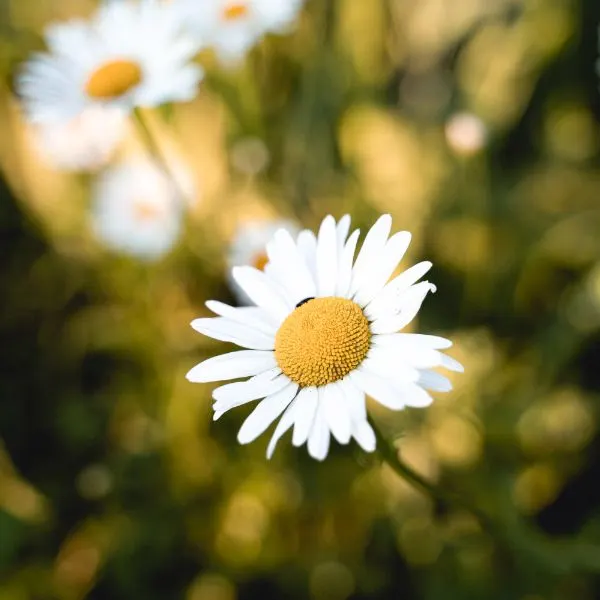
- Botanical name: Matricaria chamomilla
- Sun Requirements: Full sun
- Soil Type: Fertile, well-draining loam or sandy loam
Fragrant, sweet Chamomile seems like a funny choice to pair with a grumpy, old onion, but Nature shows us again and again that it’s the substance of the relationship that counts. In the case of onions and chamomile, both plants will really put in the effort to make things work.
Chamomile brings antifungal properties to the pairing and oddly enough, many gardeners swear that it will improve the flavor of the onions! The onions, on their end, will help to keep away the pests, but it’s really the chamomile that is the most giving of the pair. You’ll also get pretty flowers in the bargain and that part of the garden will smell a little nicer, so it’s really a win-win situation!
2. Dill
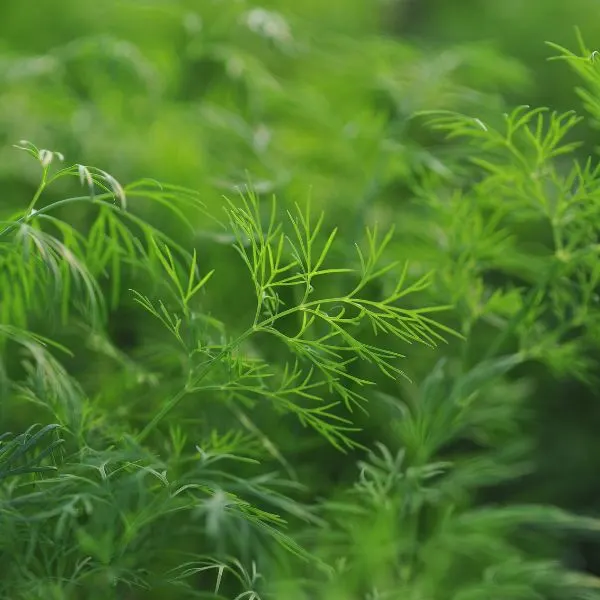
- Botanical name: Anethum graveolens
- Sun Requirements: Full sun
- Soil Type: Rich, well-drained, and slightly acidic soil or sandy loam
Dill adds the zing to your Tzatziki, fine flavors to your fish, and puts bland potato salad well into ‘proper’ territory, and it just so happens to be a fine friend for your onions, as well. Planting alongside them, these do wont argue and bicker over nutrients, and the dill produces chemicals in the soil that are said to add noticeable flavor to their onion buddies.
It’s not a huge range of perks, but it is one nice one, so consider planting these two together and see if you can taste the difference… as a reward for your troubles, that dill will also keep away aphids and spider mites, so it’s really not a bad pairing at all.
3. Summer Savory
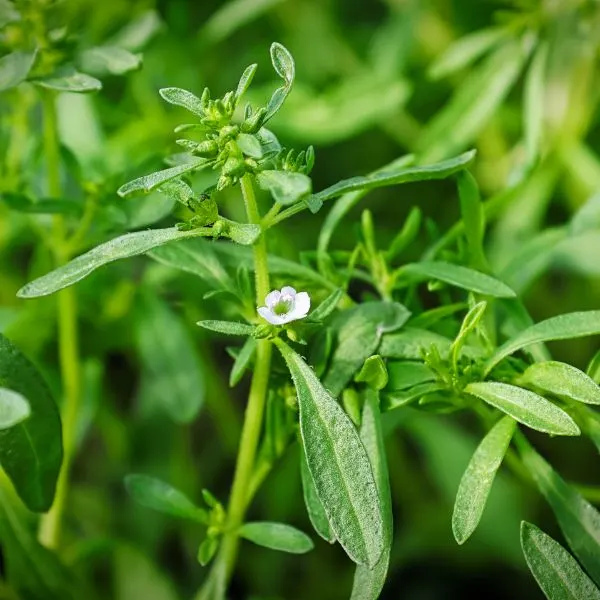
- Botanical name: Satureja hortensis
- Sun Requirements: Full sun
- Soil Type: Rich, well-drained, and organic soil
While it’s said to have medicinal qualities, we know for sure that Summer Savory levels-up the flavor in an omelet or when added to a marinade for your fish or chicken. When planted with onions, it will go a step further, as it’s said to make your onions just a little bit sweeter and the ground cover it provides can help your onions to grow a little further away from pesky weeds that might otherwise pay them a visit.
As an added bonus, this plant also keeps away black aphids, Mexican bean beetles, and cabbage moths, so keep that in mind when you are deciding on neighbors for your onion and summer savory pairing – after all, companion planting can be as simple or as complex as you like, provided you do a little homework!
4. Mustard
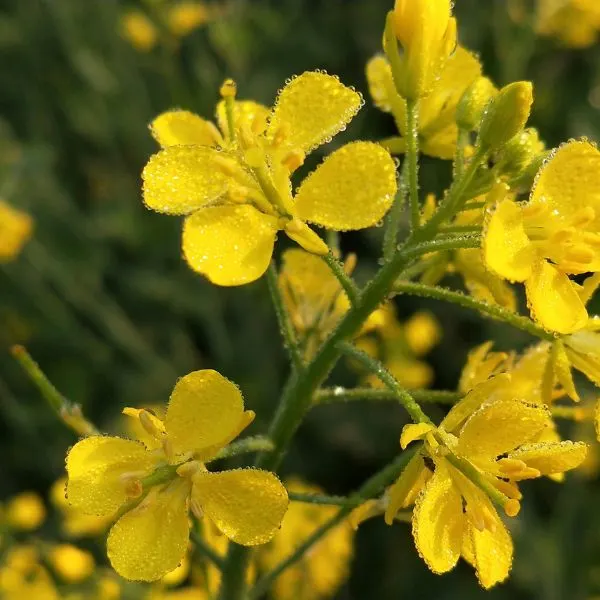
- Botanical name: Brassica nigra
- Sun Requirements: Full sun
- Soil Type: Rich, well-drained soil, with a pH no less than 6.0
Bugs and furry animals sure seem to love munching on mustard plants, but placing them with onions can level-up their defenses and the two will get along just fine.
Mind you, the roots and the leaves of the mustard plant smell a bit like garlic, so this is somewhat of a stinky pairing, but as an added bonus the little white flowers on the mustard will certainly make it a pretty, if somewhat aggressively aromatic little patch in your garden.
Healthy Veggies and Delicious fruits
5. Cabbages
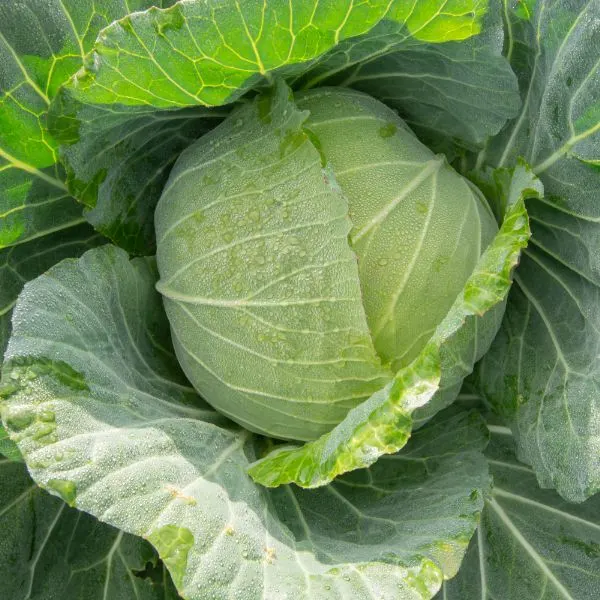
- Botanical name: Brassica oleracea var. capitata
- Sun Requirements: Full sun
- Soil Type: Loamy soil with compost
Cabbage is a garden staple that is under constant assault from hungry insects, as well as the occasional furry animals that may visit your garden from time to time. This is where planting it with your onions can be a very good idea. While humans love the sharp taste, onions are poisonous to a number of animals, and a lot of insects don’t even like to approach when they can smell them.
While the pests are kept at bay, these two plants will grow up healthy and strong together, so they make a perfectly good pairing in the garden that can help you to harvest a little more cabbage when it’s time!
6. Carrots
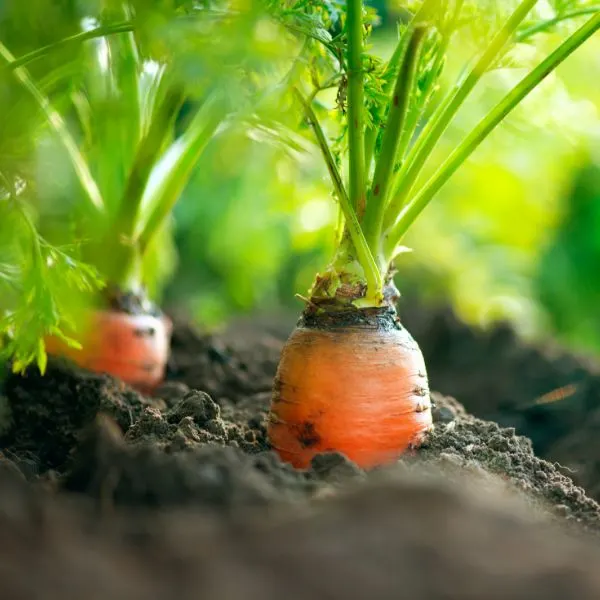
- Botanical name: Daucus carota subsp. sativus
- Sun Requirements: Full sun
- Soil Type: Sandy loam
Carrots and onions have a mutual enemy in the form of flies. Pesky little insects, when it comes to adaptability, flies really take the cake and species have evolved that can munch specifically on both carrots and onions alike. That’s where interplanting these two can really pay off!
When planted together, onions will throw out their signature scent, and when carrot flies come looking for their favorite snack the onion’s odor will confuse the little guys and they’ll be more likely to steer clear of your carrots. In turn, the carrots are said to confuse hungry onion flies, and this has proven true enough that gardeners around the world have taken to pairing their carrots and onions together to take advantage of this useful Nature hack. It sounds weird, but try it and you’ll see for yourself – carrots and onions together really seem to do well.
7. Strawberries
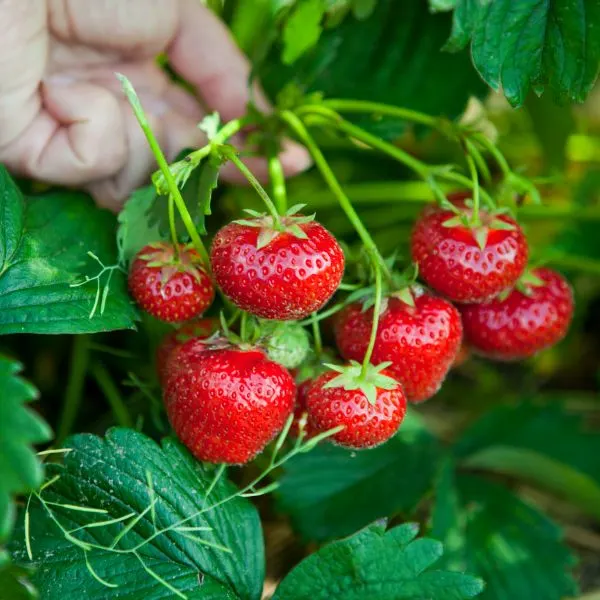
- Botanical name: Fragaria × ananassa
- Sun Requirements: Full sun
- Soil Type: Sandy loam
While you might have reservations about planting onions next to your strawberries, don’t worry about it – those onions won’t make your sweet strawberries taste bad, but will in fact PROTECT them. Mind you, it’s not a replacement for your usual strawberry-protection strategies, but planting onions next to strawberries can definitely bring down the volume of unwelcome visitors that your berries are going to get.
Onions help to keep away a wide range of pests, such as aphids, carrot flies, cabbage loopers, and even help to discourage squirrels and bunnies from probing their way into your strawberry patch. Try it out and you’ll see – while you likely wouldn’t eat them together, growing them as a pair in your garden makes good, solid sense.
8. Fruit trees
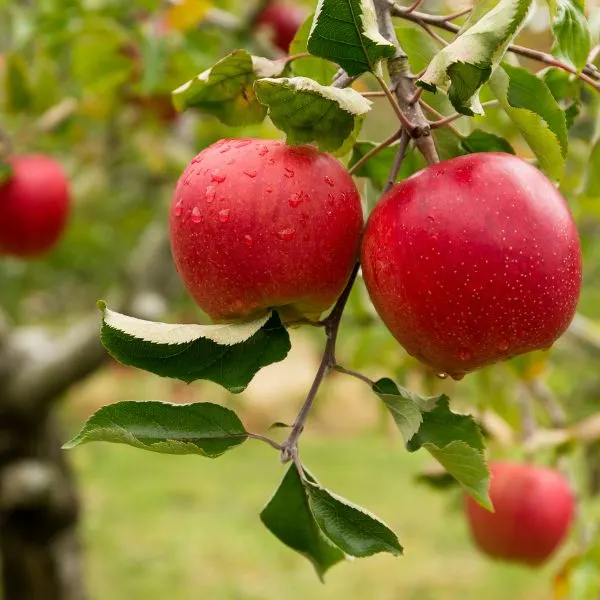
- Botanical name: N/A
- Sun Requirements: N/A
- Soil Type: N/A
With the exception of Black Walnut trees (which produce a toxin called Juglone that just isn’t good for anything that’s not also a Black Walnut tree), Fruit and other kinds of trees can benefit from having onions and any other member of the Allium family growing close by.
Onions will help to keep aphids and other pests away from your trees and while it’s only one perk, it’s certainly not a worthwhile one.
9. Peppers
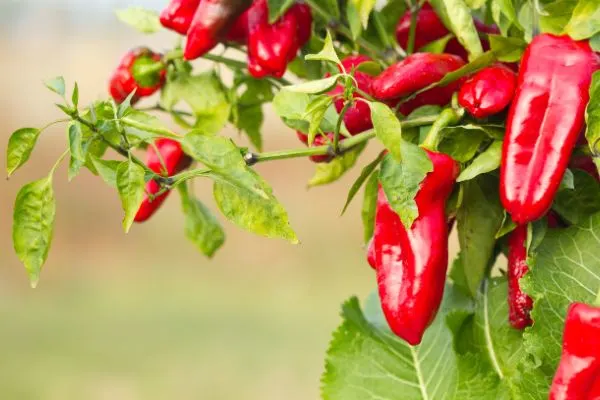
- Botanical name: Capsicum
- Sun Requirements: Full sun
- Soil Type: Rich, loamy soil
One of the problems with growing delicious peppers is that while some of your friends won’t eat them, there sure are a lot of insects and animals that will. This is where companion planting with onions can come in very handy, indeed.
Onions don’t take up much space at all, except when it comes to their odor. That same odor is what will make them useful, as the aphids and slugs that slowly make their way towards your pepper plants will get one whiff of onion and definitely think twice. It’s a solid strategy, courtesy of Mother Nature, so just remember that peppers and onions aren’t just good in your frying pan – they also pair well in your garden!
10. Tomatoes
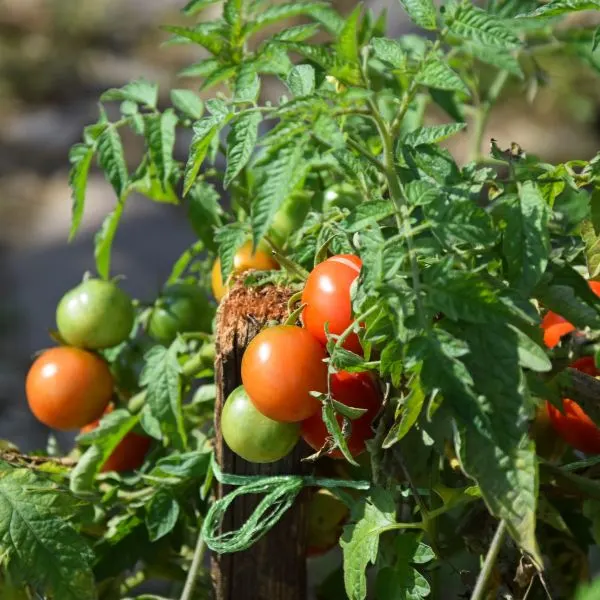
- Botanical name: Solanum lycopersicum
- Sun Requirements: Full sun
- Soil Type: Almost any – except clay- and sandy loam is best
Tomatoes can be so hard to defend sometimes. Insects, animals, and even your kids and neighbors all have a habit of making a beeline for tomatoes in your garden. While onions won’t keep those tomatoes safe from the kids or neighbors, though, they WILL help to cloak your tomatoes from pests.
As delicious as onions are, anyone who has spent time chopping and disposing of them can attest that nothing else really quite smells the same. By pairing them with your tomatoes, that odor can make them practically invisible or at least give them a fighting chance to thrive. Give it a try and you can see firsthand – onions are a tomato’s best friend.
11. Lettuce
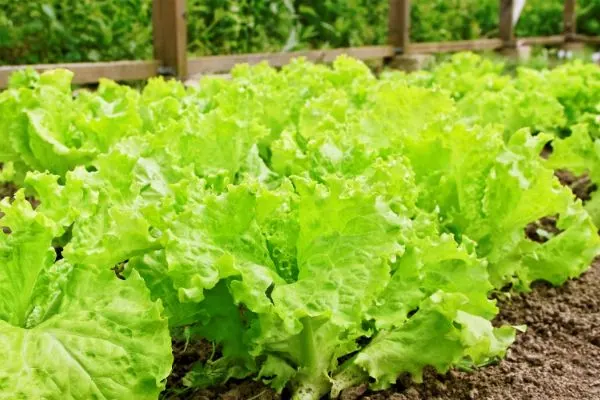
- Botanical name: Lactuca sativa
- Sun Requirements: Full sun or light shade
- Soil Type: Loose, well-drained soil with adequate nitrogen
By now we’ve established that onions are a pretty solid natural defense against pests, but if you pair them with lettuce there’s another good reason why these two will get along well together – it all comes down to their roots!
When you plant onions and lettuce together, the lettuce is going to reach its roots much farther down into the soil than your onions will, as these particular alliums have very short roots. As a result, they won’t be drawing from the same resource pool and this prevents them from fighting over nutrients.
Lettuce is a thirsty plant, too, so it can help to keep you from overwatering your onions and both plants will be all the better for it, making these two a proper good pair for planting.
Ornamental additions
12. Roses
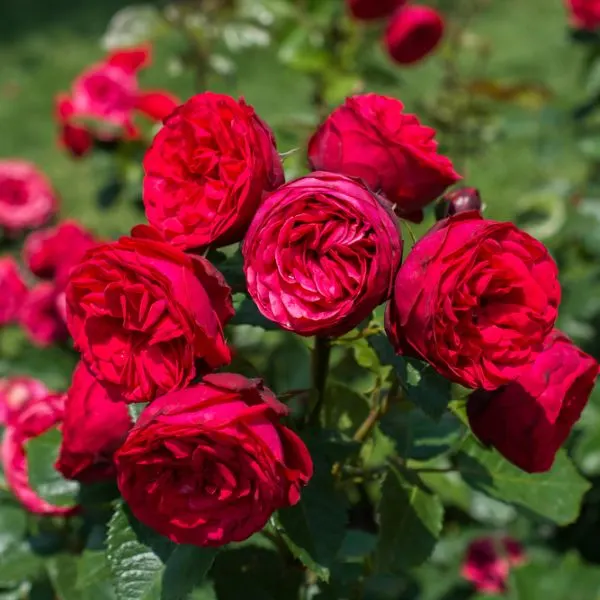
- Botanical name: Rosa
- Sun Requirements: Full sun is best, but will grow in partial shade
- Soil Type: Loam is typically best; soils must be well-drained but moisture retentive
When it comes to ornamental beauty, it sure is hard to beat roses! A big problem with these flowers that we all know and love, however, comes in the form of aphids and other pesky, sap-sucking bugs. By planting some onions with your roses, you can help to reduce the population of curious aphids by driving them off with the onion’s scent and it’s even supposed to help keep black spot away.
Give it a try and see – it’s yet another example of those odd couples in Nature that really work well together.
13. Marigolds
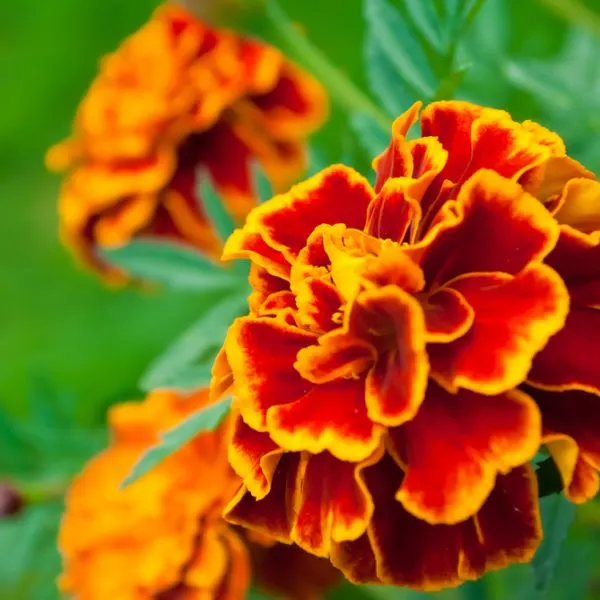
- Botanical name: Tagetes
- Sun Requirements: Full sun
- Soil Type: Well-drained, Loamy soil
Marigolds can add a bit of bright, yellow color and they’ll also bring a few other perks to the table. For one thing, root nematodes don’t seem to like marigolds, so this can help to keep them away from your onions if they are planted close by. Their flowers will also attract beneficial pollinators and the types of insects that like to eat the ones that are bothering your onions.
It’s a pretty and practical pairing and definitely worth trying in your garden at home!
14. Cosmos
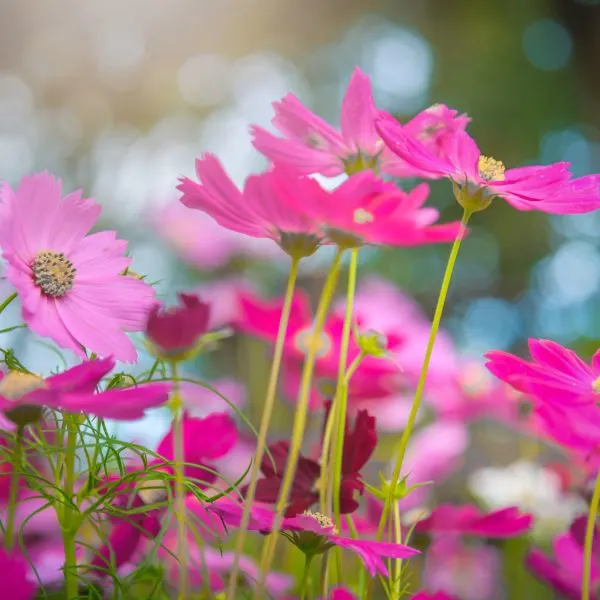
- Botanical name: Cosmos sulphureus
- Sun Requirements: Full sun (or partial shade in warmer climes)
- Soil Type: Chalky, sandy, or loamy soils
Cosmos give you a lot of color and color combination options. With flowers that can be purple, pink, red, yellow, chocolate, orange, or white, you’ve definitely got options. Some of them are even bicolor and there are edible cultivars that you can choose, as well.
While the cosmos are coloring up your onion patch, the onions will return the favor by helping your cosmos out with aphids, which tend to plague the pretty plants. Just be sure to give them a little space. The odor of the onions will still work with some modest distance and you don’t want to put them too close together, as they are both vulnerable to thrips. Space them about 12-15 inches apart, however, and it should be a good match!
Bad companions for onions
Now that we’ve gone over some of the garden ‘good guys and gals’, it’s time to move on to the bad companion plants for your onions. In the sections below, we’ll tell you a little about each and why they aren’t exactly a ‘match made in heaven’. Without further ado, let’s take a peek!
1. Other alliums
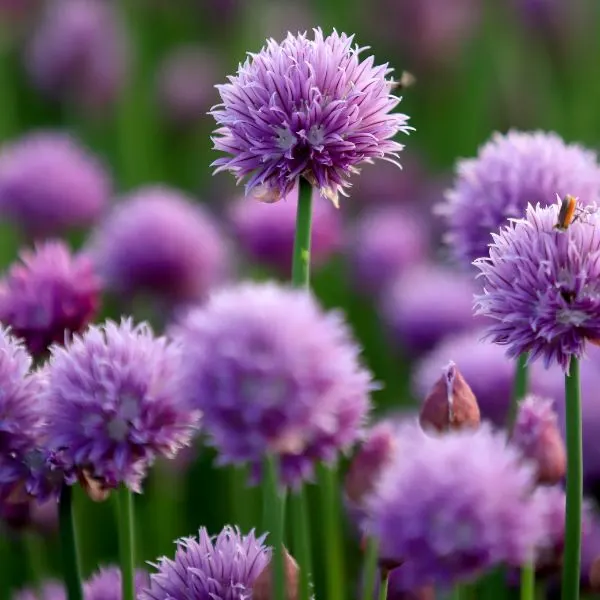
Onions shouldn’t be planted together with other types of alliums. While all alliums repel certain types of pests, the pests have evolved to fight back over time and many have specialized in munching on alliums. As a result, if you plant your onions with garlic, leek, or other alliums, then your chances for getting specialized predatory attention from pests like onion maggots will go through the roof!
Alliums mix well in the frying pan – just keep them separated in your garden or you’re asking for trouble!
2. Asparagus

After we’ve given you so many examples of yummy fruits and veggies that won’t have their taste affected by growing them with onions, we’ve come to an exception to this rule – Asparagus. If you grow them together, this combination will actually affect the flavor, and it will also stunt the growth of your asparagus plants. As such, it’s best for both plants if they never cross paths in your garden.
3. Peas
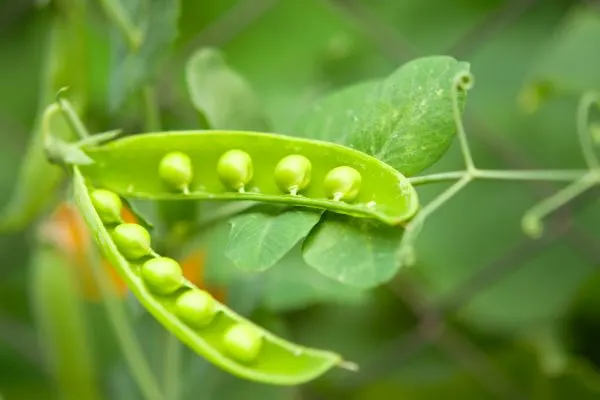
Peas and onions taste great together, but keep them far away from each other when you are growing them. When onions and peas are planted together, the growth of the peas tends to be stunted, and so they really don’t make a good pairing at all.
4. Beans
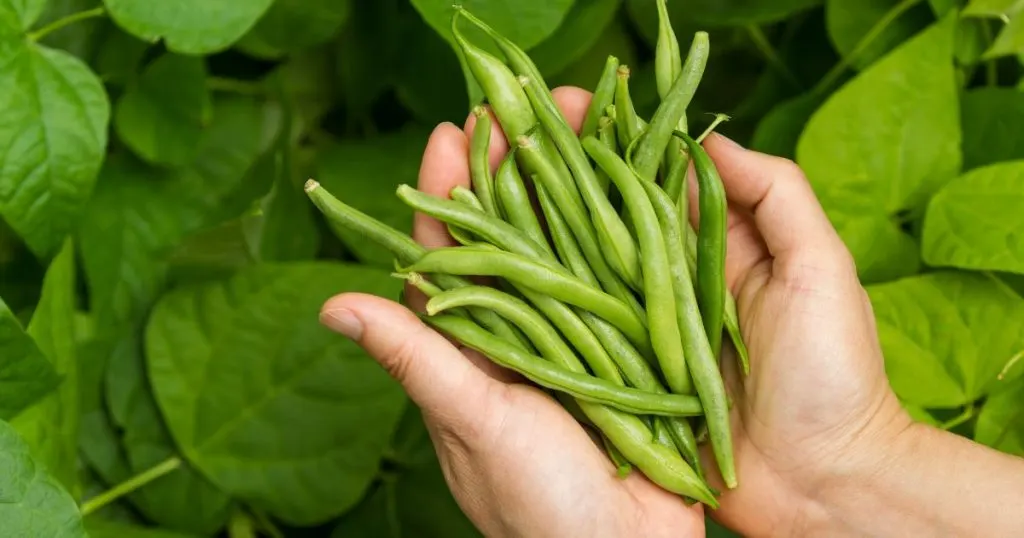
Along with peas, all types of beans seem to suffer when you plant them together with onions. While it won’t affect their taste, having onions growing close by seems to stunt their growth, and so it’s really better if they stay on their own opposite sides of the garden.
5. Sage
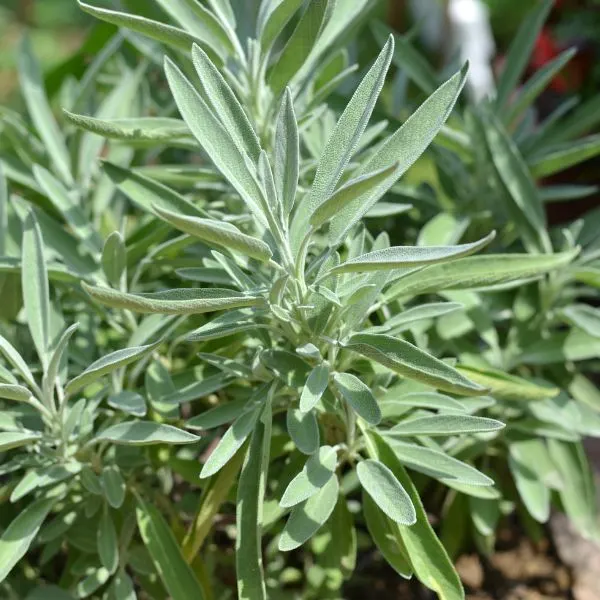
Sage is to onions what onions are to beans and peas. Put simply, if you plant sage and onions together, the sage might be fine, but it’s going to stunt the growth of its allium companion and if your onions grow up anyway, they’ll be all stunted, weird, and will probably taste funny, too. As such, we simply cannot recommend them as companion plants in good conscience.
FAQs
While it’s just about time for us to hang our hats and call it a day, before we check out, we thought we’d share some frequently asked questions on companion planting with onions. These are just a few questions that we always get on the subject and we’ll try to keep the answers short and sweet.
We hope that you’ll find a few useful info nuggets here that you can keep and put to good use and now, here are those questions!
What else can be planted next to onions?

All kinds of plants, really. It’s kind of funny, as we tend to associate onions with their strong smell and the ramifications of socializing when you’ve been eating them, but in Nature they tend to get along with almost any other plant.
You can plant them with all brassicas and they’ll do well together, and you can even plant them next to grapevines to ward away pests. While they’ll affect your grape’s flavor in the fridge, they won’t impact it at all in your garden. So, just be sure to avoid the combinations we’ve listed today and try onions with a few of your other garden favorites – excepting other alliums, of course!
Why do onions make such good companion plants for others?
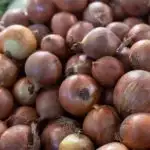
Well, in a word, they’re poisonous. Not to humans, of course, but onions are toxic to many animals and to many insects, as well. Their skin contains acetogenic compounds that will damage the digestive system of insects that haven’t evolved to be able to eat onions.
Onions repel pests like mosquitoes, termites, aphids, Colorado potato beetles, cabbage loopers, and even rabbits don’t want to eat them. As such, they make great guardians for a lot of your other fruits and veggies that tend to get a lot of bad attention from pests.
What pests affect onions so I’ll know what companion plants to avoid?
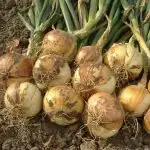
Even Superman had to worry about kryptonite and onions have a whole handful of pests adapted especially for eating up onions. Onion flies are a good example, and they’ll lay their eggs in onions and onion maggots will spring up and eat their way out.
Other pests include stem and bulb eelworms, nematodes, and thrips, so when you are choosing companions, try to avoid ones that suffer from these same pests, or you’ll just end up attracting more of them to both plants!
Wrapping up our exploration of companion plants for onions
Today we’ve taken a look at the best and worst companions for onions, and it’s easy to see that more plants get along with them than don’t. Despite their strong odor, onions won’t affect the taste of most of the companions that you pick for them, and because of that smell they will keep away a whole handful or nasty pests.
Just be sure not to plant them next to other alliums, sage, peas, beans, or asparagus, and any other plants that suffer from the same pests that eat onions. If you keep to these simple rules, then you’re going to find that onions will make pretty good companions with just about any plant out there.
Thanks so much for reading and we hope to see you again very soon!
More companion plants
